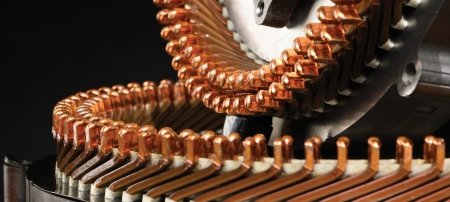Adrienne Minerick will become dean of Michigan Technological University’s School of Technology on July 1, 2018.
Minerick currently holds four titles at Michigan Tech. She is the associate dean for research and innovation in the College of Engineering, assistant to the provost for faculty development, a professor of chemical engineering and an adjunct professor of biomedical engineering. From the classroom to the lab to her own business, Minerick knows the challenges and joys of teaching, research and service.
"Dr. Minerick's prior experience as a faculty member, an administrator and an entrepreneur make her ideally suited to take over the leadership of the School of Technology," says Jackie Huntoon, provost and vice president for academic affairs. "She brings to the position a wealth of ideas about how the school can better serve its students, attract new students and contribute to economic development in the state of Michigan."
Minerick sees the school's potential to help students who do not mesh easily with the classic, learn-by-lecture model that most US education is based on. Instead, she sees ways to build up an environment where students, faculty and staff are empowered to take learning into their own hands and shift gears to better meet the needs of society and industry. Minerick succeeds Jim Frendewey, who recently wrote about the historical dichotomy of applied and theoretical engineering.
"Thanks to Jim Frendewey’s leadership," Minerick adds, "the School of Technology is well positioned to take advantage of new opportunities for our students."
Skilled as an entrepreneur, teacher, administrator
Minerick is one of four new deans announced this spring and will start the same time as the University's new president. It's an exciting time on campus and Minerick, who joined Michigan Tech in 2009, brings experiences delving into microfluidics, faculty support, academic diversity and jumpstarting a business.
Minerick's primary area of research is electrokinetics with a focus on medical microdevices, blood cell dynamics and point-of-care diagnostics. Minerick and co-founder Mary Raber, formed their company Microdevice Engineering, Inc., in the spring of 2013 as a part of the National Science Foundation’s I-Corps training following inForum’s ACTiVATE program, which offers training for women entrepreneurs. Participation was sponsored jointly by Michigan Tech and the Michigan Tech Enterprise Corporation (MTEC) SmartZone. Minerick says she had to learn across disciplines, welding her chemical engineering knowledge to electrical engineering, as well as the fabrication and design aspects of mechanical engineering.
"We haven't had the luxury of having a person who can specialize in different areas—we've all had to cross-learn to be able to problem-solve," she says. "That model is much more prevalent in industry than it has been before and at Tech; we pride ourselves at being able to say we prepare students to hit the ground running."
To Minerick, that means the School of Technology is perfectly positioned to connect the dots and ensure students who want hands-on engineering work get the education they need to make a real difference. Likewise, faculty and staff need the support to make that happen in classrooms, the machine shop, field surveys and industry-sponsored projects.
"Engineering is inherently creative. It's our job to remove the barriers to that creativity."
Diversify learning and thinking
Not everyone learns the same way. Traditional learning—step by step—has been structured for the classical engineering persona and Minerick says the School of Technology can continue to evolve the norm. In particular, she is interested in appealing to students who are global learners. In other academic spaces, global learners tend to pick up ideas in big breakthroughs rather than sequential steps, and they often log inconsistent scores with concept-by-concept homework assignments and lectures.
The very nature of the school's six engineering technology programs meshes better with these students; whether it's learning to be a surveyor or construction manager or IT programmer, the work is built on projects and tangible products that create more opportunities for the aha! moments that drive global learners. Likewise, global learners—like Albert Einstein—have gone on to make huge contributions to society with their breakthroughs.
"We in the engineering fields have been invested in the traditional," Minerick says, adding that her experiences on the diversity committee American Society for Engineering Education and running the year-long Action on Diversity campaign opened her eyes. "We need to consider the impacts of technology and knowledge; we need connectivity between our students and society."
"In chemical engineering, for example, the curriculum hasn't changed much since the 1960s—but society has changed a lot. In the School of Technology, we have the opportunity to narrow gaps between educational training and industry practice."
By bringing in more perspectives and thinking styles, diversity improves how graduates face challenges in their careers . And once they are alumni, Minerick plans to engage with them more and to build more affinity with older alumni. She says it all starts with fostering that growth behind the scenes, letting faculty and staff pilot ideas to build more relationships and improve their classes and programs.
"We have so much potential," Minerick says. "It's my job to secure, align and organize resources so that everybody else can do what they need to do."
Michigan Technological University is an R1 public research university founded in 1885 in Houghton, and is home to nearly 7,500 students from more than 60 countries around the world. Consistently ranked among the best universities in the country for return on investment, Michigan's flagship technological university offers more than 185 undergraduate and graduate degree programs in science and technology, engineering, computing, forestry, business, health professions, humanities, mathematics, social sciences, and the arts. The rural campus is situated just miles from Lake Superior in Michigan's Upper Peninsula, offering year-round opportunities for outdoor adventure.







Comments